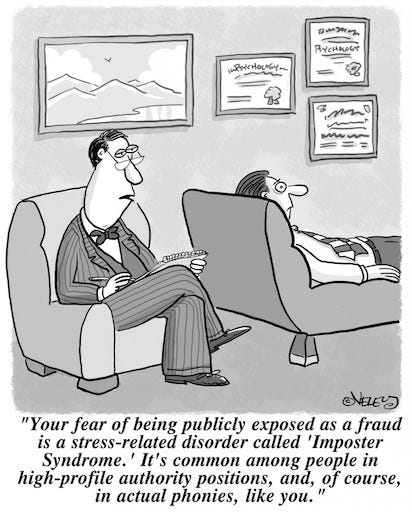When You Think You’re a Fraud
When You Think You’re a Fraud
Imposter Syndrome is a lot like alcoholism or gout. It comes in waves, but even when you’re not having an episode, it sits there dormant, waiting for the right mix of circumstances to trigger a flare up.

Hi, my name is Jeff and I have Imposter Syndrome. I’ve said this out loud a number of times and it always makes me feel better to know that others share my somewhat irrational fears. It’s one of the most ironic set of emotions I think I’ve ever experienced. The feelings are a downward spiral where you even question your ability to self-diagnose. (Who knows? Maybe I just suck at my job )
I can’t help but compare myself to others in the field, but I’m pretty comfortable recognizing someone else’s skill level, even when it’s better than my own. My triggers are more about what others expect my knowledge level to be at, regardless of how absurd those expectations are. For example, I’ve never actually worked with MongoDB. Sure, I’ve read about it, I’m aware of its capabilities and maybe even a few of its hurdles. But I’m far from an expert on it, despite its popularity. This isn’t a failing of my own, but merely a happen-stance of my career path. I just never had an opportunity to use or implement it.
For those of us with my strand of imposter syndrome, this opportunity doesn’t always trigger the excitement of learning something new, but the colossal self-loathing for not having already known it. Being asked a question I don’t have an answer to is my recurring stress dream. But this feeling isn’t entirely internal. It’s also environmental.
Google did a study recently that said the greatest indicator for high performing teams is being nice. That’s the sort of touchy, feely response that engineers tend to shy away from, but it’s exactly the sort of thing that eases imposter syndrome. Feeling comfortable enough to acknowledge your ignorance is worth its weight in gold. There’s no compensation plan in the world that can compete with a team you trust. There’s no compensation plan in the world that can make up for a team you don’t. When you fear not knowing or asking for help out of embarrassment, you know things have gone bad. That’s not always on you.
The needs of an employee and the working environment aren’t always a match. The same way some alcoholics can function at alcohol related functions and others can’t. There’s no right or wrong, you just need to be aware of the environment you need and try to find it.
Imposter syndrome has some other effects on me. I tend to combat it by throwing myself into my work. If I read one more blog post, launch one more app or go to one more meetup, then I’ll be cured. At least until the next time something new (or new to me) pops up. While I love reading about technology, there’s an opportunity cost that tends to get really expensive. (Family time, hobby time or just plain old down time)
If you’re a lead in your org, you can help folks like me with a few simple things
- Be vulnerable. Things are easier when you’re not alone
- Make failure less risky. It might be through tools, coaching, automation etc. But make failure as safe as you can.
- When challenging ideas propose problems to solve instead of problems that halt. “It’s not stateless” sounds a lot worse than “We need to figure out if we can make it stateless”
Writing this post has been difficult, mainly because 1) I don’t have any answers and 2) It’s hard not to feel like I’m just whining. But I thought I’d put it out there to jump start a conversation amongst people I know. I’ve jokingly suggested an Imposter Syndrome support group, but the more I think about it, the more it sounds like a good idea.